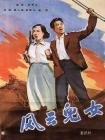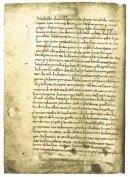inviata da Riccardo Venturi - 12/3/2007 - 01:17
Lingua: Inglese
La traduzione inglese di Charles Budd (1912)
English version by Charles Budd (1912)
From "Chinese Poems", Oxford, 1912.
Da "Chinese Poems", Oxford, 1912.
English version by Charles Budd (1912)
From "Chinese Poems", Oxford, 1912.
Da "Chinese Poems", Oxford, 1912.
THE OLD SOLDIER'S RETURN
I was but fifteen when I left my friends
For distant climes to fight our Country's foe,
And now I'm eighty -- back for the first time
To see the home I left so long ago.
Where is the house? I should be near it now,
Yet posssibly I may have gone astray;
Long years abroad have blurred the youthful brain,
I'll ask this countryman to point the way.
'The house is yonder -- midst those grassy mounds,
Beneath the shade of fir and cypress trees,
And there lie buried all the kith and kin
Of former tillers of these fallow leas.'
The veteran sighed and wandered to the house,
And found it overgrown and desolate;
A startled hare fled through the kennel's hole,
And pheasants flew from ceiling beams ornate.
Exhausted by the journey and his grief,
The old man plucked some grain from patches wild,
And mallows from around the courtyard well,
As in the days when but a little child.
But when the homely fare was cooked and spread,
And not a friend to cheer the lonely place,
He rose, and going out to eastward gazed,
While tears flowed down his worn and furrowed face.
I was but fifteen when I left my friends
For distant climes to fight our Country's foe,
And now I'm eighty -- back for the first time
To see the home I left so long ago.
Where is the house? I should be near it now,
Yet posssibly I may have gone astray;
Long years abroad have blurred the youthful brain,
I'll ask this countryman to point the way.
'The house is yonder -- midst those grassy mounds,
Beneath the shade of fir and cypress trees,
And there lie buried all the kith and kin
Of former tillers of these fallow leas.'
The veteran sighed and wandered to the house,
And found it overgrown and desolate;
A startled hare fled through the kennel's hole,
And pheasants flew from ceiling beams ornate.
Exhausted by the journey and his grief,
The old man plucked some grain from patches wild,
And mallows from around the courtyard well,
As in the days when but a little child.
But when the homely fare was cooked and spread,
And not a friend to cheer the lonely place,
He rose, and going out to eastward gazed,
While tears flowed down his worn and furrowed face.
inviata da Riccardo Venturi - 12/3/2007 - 01:27
Lingua: Inglese
La traduzione inglese di Arthur Waley (1919)
English version by Arthur Waley (1919)
From: Arthur Waley. Translations From the Chinese.
New York: Alfred A. Knopf (1919, 1941)
Da: Arthur Waley. Translations From the Chinese.
New York: Alfred A. Knopf (1919, 1941).
English version by Arthur Waley (1919)
From: Arthur Waley. Translations From the Chinese.
New York: Alfred A. Knopf (1919, 1941)
Da: Arthur Waley. Translations From the Chinese.
New York: Alfred A. Knopf (1919, 1941).
OLD POEM
At fifteen I went with the army,
At fourscore I came home.
On the way I met a man from the village,
I asked him who there was at home.
"That over there is your house,
All covered over with trees and bushes."
Rabbits had run in at the dog-hole,
Pheasants flew down from the beams of the roof.
In the courtyard was growing some wild grain;
And by the well, some wild mallows.
I'll boil the grain and make soup.
Soup and porridge are both cooked,
But there is no one to eat them with.
I went out and looked towards the east,
While tears fell and wetted my clothes.
At fifteen I went with the army,
At fourscore I came home.
On the way I met a man from the village,
I asked him who there was at home.
"That over there is your house,
All covered over with trees and bushes."
Rabbits had run in at the dog-hole,
Pheasants flew down from the beams of the roof.
In the courtyard was growing some wild grain;
And by the well, some wild mallows.
I'll boil the grain and make soup.
Soup and porridge are both cooked,
But there is no one to eat them with.
I went out and looked towards the east,
While tears fell and wetted my clothes.
inviata da Riccardo Venturi - 12/3/2007 - 01:30
Lingua: Inglese
La versione inglese di Kenneth Rexroth (1970)
English Version by Kenneth Rexroth (1970)
From: Kenneth Rexroth. One Hundred More Poems
from the Chinese. New Directions (1970)
Da: Kenneth Rexroth. One Hundred More Poems
from the Chinese. New Directions (1970)
English Version by Kenneth Rexroth (1970)
From: Kenneth Rexroth. One Hundred More Poems
from the Chinese. New Directions (1970)
Da: Kenneth Rexroth. One Hundred More Poems
from the Chinese. New Directions (1970)
HOME
At fifteen I joined the army.
At twenty-five I came home at last.
As I entered the village
I met an old man and asked him,
"Who lives in our house now?"
"Look down the street,
There is your old home."
Pines and cypresses grow like weeds.
Rabbits live in the dog's house.
Pigeons nest in the broken tiles.
Wild grass covers the courtyard.
Rambling vines cover the well.
I gather wild millet and make a pudding
And pick some mallows for soup.
When soup and pudding are done,
There is no one to share them.
I stand by the broken gate,
And wipe the tears from my eyes.
At fifteen I joined the army.
At twenty-five I came home at last.
As I entered the village
I met an old man and asked him,
"Who lives in our house now?"
"Look down the street,
There is your old home."
Pines and cypresses grow like weeds.
Rabbits live in the dog's house.
Pigeons nest in the broken tiles.
Wild grass covers the courtyard.
Rambling vines cover the well.
I gather wild millet and make a pudding
And pick some mallows for soup.
When soup and pudding are done,
There is no one to share them.
I stand by the broken gate,
And wipe the tears from my eyes.
inviata da Riccardo Venturi - 12/3/2007 - 01:32
Lingua: Inglese
La versione inglese di Wai-lim Yip (1976)
English Version by Wai-lim Yip (1976)
From: Wai-lim Yip. Chinese Poetry: Major Modes and Genres.
University of California Press (1976).
Da: Wai-lim Yip. Chinese Poetry: Major Modes and Genres.
University of California Press (1976).
English Version by Wai-lim Yip (1976)
From: Wai-lim Yip. Chinese Poetry: Major Modes and Genres.
University of California Press (1976).
Da: Wai-lim Yip. Chinese Poetry: Major Modes and Genres.
University of California Press (1976).
AT FIFTEEN I WENT TO WAR
1. At fifteen I went to war
2. At eighty now I made it home
3. Meeting one from my village:
4. "Who now is at home?"
5. "Over there is your house."
6. Pines, cypresses, tombs in clusters
7. Rabbits come in from dog-holes.
8. Pheasants fly upon the beams.
9. Middle of court: wild grains rise.
10. Well's edge: wild mallows grow.
11. Grind grains to make rice.
12. Pick mallows to make soup.
13. Rice and soup soon ready.
14. But for whom?
15. Go to the east gate to look out:
16. Tears drench my clothes
1. At fifteen I went to war
2. At eighty now I made it home
3. Meeting one from my village:
4. "Who now is at home?"
5. "Over there is your house."
6. Pines, cypresses, tombs in clusters
7. Rabbits come in from dog-holes.
8. Pheasants fly upon the beams.
9. Middle of court: wild grains rise.
10. Well's edge: wild mallows grow.
11. Grind grains to make rice.
12. Pick mallows to make soup.
13. Rice and soup soon ready.
14. But for whom?
15. Go to the east gate to look out:
16. Tears drench my clothes
inviata da Riccardo Venturi - 12/3/2007 - 01:33
Lingua: Italiano
Versione italiana di Riccardo Venturi.
Ho scelto, per la seguente versione italiana, quella inglese di Kenneth Rexroth. Mi è apparsa al tempo stesso come fedele all'originale (ovviamente per quel che mi è stato dato di intuire) ma senza la secchezza dell'originale, riprodotta fedelmente dalla versione di Wai-lim Yip. Quest'ultima sarebbe stata forse da preferire per una maggiore aderenza al testo originale, ma l'estrema stringatezza dei componimenti cinesi classici rimane estranea ai nostri occhi. La versione di Rexroth permette quindi di apprezzare meglio il valore di questo straordinario e antichissimo documento, assai importante per le CCG/AWS. Ho scartato del tutto le versioni di Budd e Waley perché palesemente delle rielaborazioni basate sull'originale (quella di Budd basata addirittura con eccessiva libertà).
La più antica canzone contro la guerra, e un tema eterno: quello del ritorno a casa del soldato che trova nel suo villaggio e nella sua casa soltanto rovina e solitudine. Tutti sono morti o andati via.
Ho scelto, per la seguente versione italiana, quella inglese di Kenneth Rexroth. Mi è apparsa al tempo stesso come fedele all'originale (ovviamente per quel che mi è stato dato di intuire) ma senza la secchezza dell'originale, riprodotta fedelmente dalla versione di Wai-lim Yip. Quest'ultima sarebbe stata forse da preferire per una maggiore aderenza al testo originale, ma l'estrema stringatezza dei componimenti cinesi classici rimane estranea ai nostri occhi. La versione di Rexroth permette quindi di apprezzare meglio il valore di questo straordinario e antichissimo documento, assai importante per le CCG/AWS. Ho scartato del tutto le versioni di Budd e Waley perché palesemente delle rielaborazioni basate sull'originale (quella di Budd basata addirittura con eccessiva libertà).
La più antica canzone contro la guerra, e un tema eterno: quello del ritorno a casa del soldato che trova nel suo villaggio e nella sua casa soltanto rovina e solitudine. Tutti sono morti o andati via.
RITORNO A CASA
A quindici anni entrai nell'armata.
A venticinque, infine, tornai a casa.
Quando entrai nel villaggio
incontrai un vecchio e gli chiesi:
"Chi vive ora nella nostra casa?"
"Guarda giù per la strada,
là c'è la tua vecchia casa."
Pini e cipressi crescono come malerba.
Ci sono conigli nella cuccia del cane.
I piccioni fanno il nido tra le tegole rotte.
Il cortile è ricoperto d'erbacce.
Tralci di vite selvatica coprono il pozzo.
Raccolgo del miglio e mi faccio una sbobba
e raccolgo un po' di malva per farmi la zuppa.
Quando la zuppa e la sbobba sono pronte
Non c'è nessuno con cui dividerle.
Me ne sto all'ingresso diroccato
e mi asciugo le lacrime agli occhi.
A quindici anni entrai nell'armata.
A venticinque, infine, tornai a casa.
Quando entrai nel villaggio
incontrai un vecchio e gli chiesi:
"Chi vive ora nella nostra casa?"
"Guarda giù per la strada,
là c'è la tua vecchia casa."
Pini e cipressi crescono come malerba.
Ci sono conigli nella cuccia del cane.
I piccioni fanno il nido tra le tegole rotte.
Il cortile è ricoperto d'erbacce.
Tralci di vite selvatica coprono il pozzo.
Raccolgo del miglio e mi faccio una sbobba
e raccolgo un po' di malva per farmi la zuppa.
Quando la zuppa e la sbobba sono pronte
Non c'è nessuno con cui dividerle.
Me ne sto all'ingresso diroccato
e mi asciugo le lacrime agli occhi.
Ma il titolo qual'é ???
(Willy)
Problemi di tastiera ???
(Willy)
(Willy)
E' il titolo cinese riportato in intestazione e trascritto con mezzi di fortuna in cinese moderno. Purtroppo non saprei proprio dirti come si legge...[RV]
Problemi di tastiera ???
(Willy)
Chiaramente non ho un pc con una tastiera cinese. Esiste un set di caratteri cinesi nel font Arial Unicode. Io a volte uso un particolare programma che mi permette di convertire in ideogrammi un testo cinese a partire dalla trascrizione latina ufficiale detta "Pin Yin", ma in questo caso non è applicabile dato che non conosco l'esatta trascrizione degli ideogrammi della canzone/poesia in questione (la quale, oltretutto, è scritta in cinese di 2000 anni fa e in caratteri tradizionali, non più in uso nella Cina moderna). Saluti. [RV]
×
![]()









"Here is a Han poem taken from Chinese Poetry: Major Modes and Genres edited and translated by Wai-lim Yip with calligraphy by Kuo-hsiung Chen. (University of California Press, 1976.) [...] The poem is from the Yüeh-Fu collection of ballad-songs collected by the imperial Music Bureau during the Han Dynasty. The accompanying music is now lost."
(From: World Poetry Translation)
Il seguente testo proviene dalla "Collezione Yüeh-Fu" di ballate e canzoni raccolta dall'Ufficio Musicale Imperiale durante la dinastia Han. Poiché la dinastia Han regnò in Cina dal 202 a.C. al 220 d.C., la seguente è indubbiamente la canzone contro la guerra più antica di tutta la raccolta, e una delle più antiche mai scritte. Perché di una componimento musicale vero e proprio si tratta, pur essendo la musica purtroppo andata persa; ciò è confermato di per sé dalla sua appartenenza ad una raccolta di composizioni ordinata da un ufficio imperiale preposto alla musica.
Presentiamo il testo della canzone con un'immagine .jpg, essendoci stato impossibile reperirlo in altra forma e non essendo in grado di trascriverlo. Il testo è in cinese dell'epoca e in caratteri tradizionali.